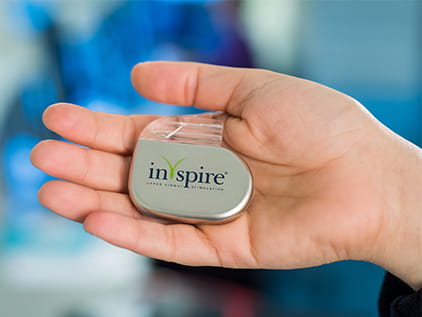Could a good night's sleep also mean a healthier heart? Over time, loud snoring and disrupted breathing can make for restless nights and cause fatigue. These are also symptoms of obstructive sleep apnea, a sleep disorder associated with a serious heart condition called atrial fibrillation, or AFib.
"We've known for a long time that high blood pressure, previous stroke and diabetes are risk factors for AFib," says Rhea Pimentel, MD, electrophysiologist at The University of Kansas Health System. "But more recently, there have been studies looking at atypical risk factors for atrial fibrillation, and one of them is sleep apnea."
AFib is the most common type of heart rhythm disorder and is characterized by a fast, irregular heartbeat. According to the Centers for Disease Control and Prevention, at least 2.7 million people in the U.S. have AFib. If left untreated, AFib can lead to blood clots, strokes or weakening of the heart muscle (cardiomyopathy), which can result in symptoms of congestive heart failure. Similarly, untreated sleep apnea can result in a number of health conditions.
"Untreated sleep apnea is associated with high blood pressure, pulmonary hypertension and stroke," Dr. Pimentel says. Other health issues associated with sleep apnea include weight gain and fatigue. "When you wake up several times at night, you're not getting quality sleep, which can lead to fatigue and inadequate physical activity."
A common, but often overlooked, condition
Obstructive sleep apnea is a type of sleep disorder that occurs when the muscles in the back of the throat relax during sleep, obstructing the airway repeatedly for a few seconds. This can reduce breathing or cause breathing to stop for a short period of time, and may occur several times during the night. Usually, the brain recognizes that the body is deprived of oxygen and wakes up. Waking up repeatedly each night leads to poor sleep quality and can cause problems with concentration, memory and mood.
Sleep apnea affects more than 18 million American adults, but it is often underdiagnosed. People with sleep apnea may be unaware of their condition until a sleep partner complains of loud, heavy snoring.
"Approximately 20% of sleep apnea patients are undiagnosed, until they are evaluated for atrial fibrillation," says Dr. Pimentel. "It's a much bigger issue than we imagine."
Connecting the dots
The specific link between sleep apnea and atrial fibrillation is still unclear, but most experts believe that the lack of oxygen causes the top chambers of the heart to dilate in an attempt to get enough oxygenated blood to other organs. This dilation causes a fast, irregular heartbeat, and also increases blood pressure.
Without successful treatment, sleep apnea can result in serious consequences for those with AFib. In fact, even those who have received treatment for AFib are at an increased risk of recurrent or worsened heart rhythm disturbances if they don't address their sleep apnea.
"If you don't adequately treat sleep apnea, you have a higher chance of developing AFib again, even if you have had a heart treatment," Dr. Pimentel says.
Diagnosing and treating sleep apnea
Sleep apnea can be diagnosed with a physical evaluation, family history and a sleep study.
"If you suspect you have sleep apnea, whether because you have been told that you snore a lot or stop breathing while you sleep, or if you constantly feel fatigued or have recently been diagnosed with AFib, you should be evaluated for sleep apnea," recommends Dr. Pimentel.
Sleep study results measure:
- The levels of oxygen in the blood
- Air movement through the nose
- Heart rate
- Chest movements that show effort during breathing
The results of a thorough evaluation will determine the best treatment for sleep apnea. Possible treatment options may include:
- Positional therapy: A mild case of sleep apnea may be treated with positional therapy. Positional therapy uses devices that can be worn around the waist or the back to help individuals sleep on their side.
"When you sleep on your back, it's easier for the tongue to fall on the back of the throat and block your airway," explains Dr. Pimentel. -
Lifestyle changes: Certain lifestyle changes, such as losing weight or avoiding certain substances, can also help improve sleep apnea symptoms.
"Many people who have sleep apnea are overweight or obese. Losing weight definitely helps," Dr. Pimentel says. Other behavioral changes such as avoiding alcoholic beverages, which can relax throat muscles, and quitting smoking may also help improve airflow.
-
Continuous positive airway pressure: For more moderate to severe cases of sleep apnea, continuous positive airway pressure, or CPAP, may be recommended. CPAP is a portable machine that delivers air pressure through a mask placed over the nose during sleep. The increased air pressure is enough to keep the upper airway passages open, preventing apnea and maintaining the flow of oxygen.
-
Surgery: Surgical procedures to treat sleep apnea are also available, although they are not usually recommended as a first line of treatment. Those who have sleep apnea associated with jaw or neck abnormalities may benefit from surgery.






